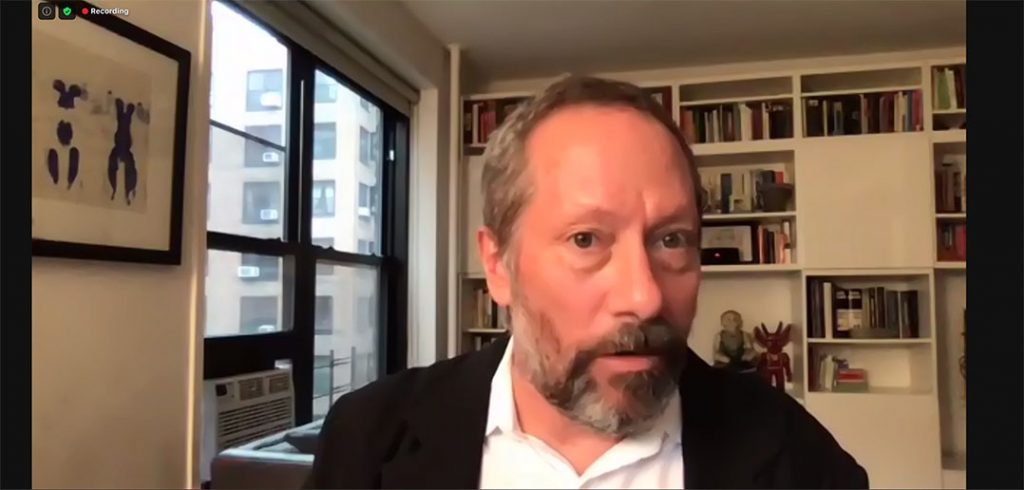When he set out to write his latest book, Eduardo Porter did not plan to write about racism. He had a much more precise concern.
“It was America’s dead babies. I was trying to get my head around why so many babies, about seven out of 1,000 born, die before they turn 1,” said the New York Times columnist in an online conversation on Oct. 29.
Even though scientific achievements made over the last 50 years have dramatically increased the mortality of children born after 32 weeks, the mortality rate in the United States is almost double the rate in Korea, three times the rate in Japan, and six times the rate in Iceland, he said. Most of the U.S. babies who die young are also born to mothers who are poor and Black.
“The U.S. may be the richest country in the world, so the question is, why don’t we behave like one? It’s racial conflict,” he said.
In an online conversation hosted by Fordham’s departments of American Studies, Latin American and Latino Studies, and Sociology and Anthropology, Porter laid out the premise of American Poison: How Racial Hostility Destroyed Our Promise (Penguin Random House, 2020), which is that racism weakens American’s belief in one of the most critical components of a modern, functioning society: public goods.
“One of my core arguments is that Americans decided that if public goods must be shared across lines of race and ethnicity, they would rather do without them,” he said.
In his talk, which was followed by a response from Janice Berry, Ph.D., associate professor of economics, and a lengthy question and answer period, Porter said that although President Franklin Delano Roosevelt is lionized by liberals, his New Deal was colored by the stain of racial hostility. To win the support of white southern Democrats in the Senate, Roosevelt made sure that major parts of the legislation excluded anyone who was not white.
Porter cited several examples:, a major component of the New Deal that is credited with increasing homeownership, was a big contributor to redlining, a process by which predominantly black neighborhoods were declared blighted. The Civilian Conservation Corps, a work relief program created in 1933 that employed hundreds of thousands of young men, housed them in camps that were segregated by race. And when it was first created, Social Security excluded domestic and farm workers, the majority of whom were black
“This may offend those believers in the grand alliance of working men and women, immigrants, and racial minorities coming together to confront corporate leviathans, but that is what happened. Racism stymied the great liberal leap in American policymaking,” Porter said.
The civil rights movement provoked a backlash of the white majority against the idea of a society wrapped together by a common safety net, he said, adding that it was not a coincidence that Medicare and Medicaid, the last programs inspired by that ethos, were signed into law in 1965, one year after the Civil Rights Act. After that, he said, white Americans resisted the creation of additional social welfare programs.
“That same year, President Lyndon Johnson presented Americans with a ‘War on Crime,’ and a few years later, Richard Nixon offered this war as the new lodestar for American social policy,” he said, noting that for the next five decades, prison became the country’s preferred tool of social management.
Today, the country is considerably less healthy than its peers as a result, as measured by metrics such as the number of Americans living below the poverty line. And although technology advances and globalization are often blamed for the decline, Porter noted that countries such as France, Germany, and Canada have faced the same challenges.
“So when the good jobs went away, and wages stagnated, the bedraggled American safety net just could not hold the line. America’s dead babies, its bloated prisons, its idle men, its single mothers can all be traced to this exceptional fact: Americans chose to let those sinking sink,” he said.
“Why? Because a lot of those people sinking were people of color.”
Ironically, he said, these attitudes have betrayed white Americans as well.
“That part of white America that’s addled by opioids, ravaged by suicide, and despairing of a future is also a victim of a nation that refuses to care,” he said.
There is some hope that change is coming, he said, as the American population is growing more diverse. While three out of four Baby Boomers are white and non-Hispanic, only 55 percent of Americans born between 1981 and 1996 fall into that group. Eventually, Porter said, color lines are going to blur, and that the Black-white divide that has defined racial relationships for hundreds of years will soften.
Porter confessed that he is not very optimistic though.
“Minorities might eventually reshape American attitudes, but I would not discount the political clout of white voters trying to delay their decline from power,” he said.
The problem, he said, is that white voters in rural areas don’t interact with minorities, but they understand that minorities will eventually be moving into their towns, and it scares them.
“Conquering this fear, to my mind, is America’s most immediate challenge. The task of progressive politicians is to construct a public discourse that embraces America’s multiplicity of people,” he said.
“They must convince Americans to invite solidarity across lines of identity.”
To watch Porter’s lecture and Q&A, click here.

